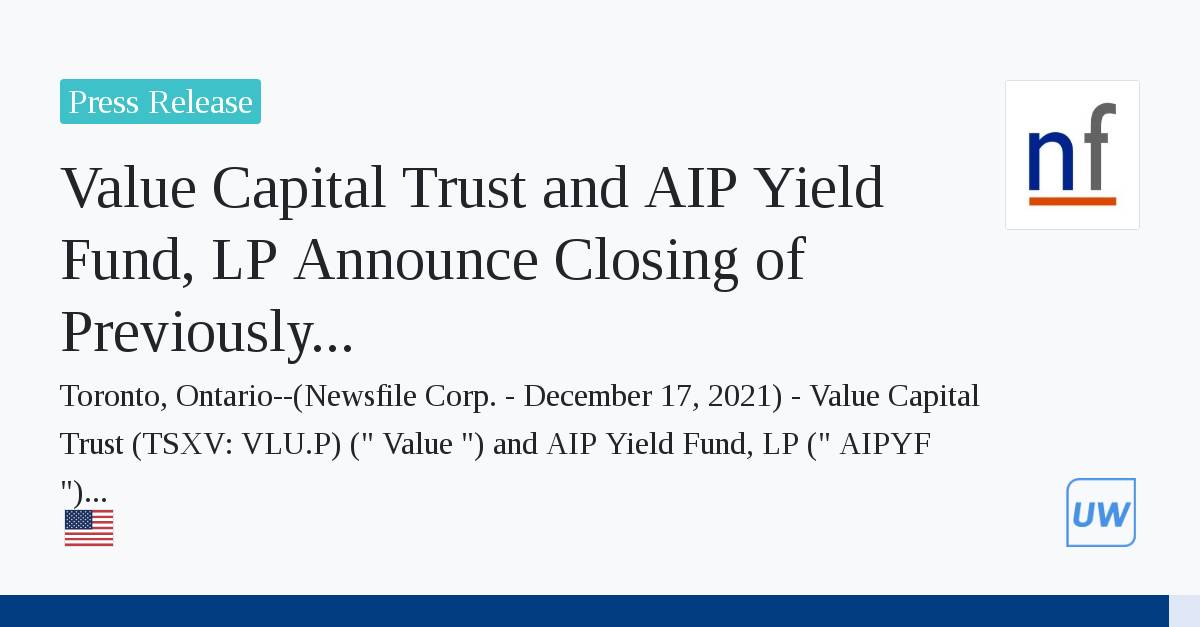Fintech
Value Capital Trust and AIP Yield Fund, LP Announce Closing of Previously Announced Private Placement

Toronto, Ontario–(Newsfile Corp. – December 17, 2021) – Value Capital Trust (TSXV: VLU.P) (“Value“) and AIP Yield Fund, LP (“AIPYF“) announce that they have closed the previously announced brokered private placement of subscription receipts of AIPYF (the “Subscription Receipts“) announced on February 18, 2021, as updated in press releases dated June 24, 2021, August 6, 2021 and November 23, 2021. Pursuant to the offering (the “Offering“), AIPYF issued an aggregate of 2,752,500 Subscription Receipts at a price of USD$2.00 per Subscription Receipt (the “Offering Price“) for aggregate gross proceeds of USD$5,505,000. The Offering was led by Laurentian Bank Securities Inc., as lead agent (the “Lead Agent“), Canaccord Genuity Corp., Cormark Securities Inc. and iA Private Wealth Inc. (together with the Lead Agent, the “Agents“) pursuant to an agency agreement (the “Agency Agreement“) between AIPYF, AIP Yield Fund GP Inc., AllTrades Industrial Development, LLC (“AllTrades“), Value and the Agents.
The Subscription Receipts were created and issued pursuant to the terms of a subscription receipt agreement (the “Subscription Receipt Agreement“) between TSX Trust Company, as subscription receipt agent and escrow agent (the “Escrow Agent“), AIPYF, AllTrades, Value and the Lead Agent, on its own behalf and on behalf of the Agents. Each Subscription Receipt will be automatically converted, without payment of additional consideration or further action by the holder thereof, for one limited partnership unit (the “Units“), subject to adjustment in certain events, immediately upon the satisfaction or waiver of certain customary escrow release conditions set forth in the Subscription Receipt Agreement (the “Escrow Release Conditions“) at or before 5:00 p.m. (Toronto time) on April 16, 2022 (the “Escrow Release Deadline“). Upon closing of the Proposed Transaction (as defined below), each Unit will be automatically exchanged for a trust unit of Value.
Pursuant to the terms of the Agency Agreement, in consideration for their services in connection with the Offering, the Agents received (A) a cash commission equal to 8.0% of the aggregate gross proceeds of the Offering excluding proceeds on subscriptions from certain subscribers (the “Agents’ Commission“), and (B) such number of agents’ warrants (the “Agents’ Warrants“) as is equal to: (i) 8.0% of the aggregate number of Subscription Receipts issued under the Offering, excluding Subscription Receipts issued to certain subscribers. Each Agents’ Warrant is exercisable into one Unit at the Offering Price for a period of 12 months following satisfaction of the Escrow Release Conditions. On closing of the Offering, the gross proceeds from the Offering less 50% of the Agents’ Commission, as well as certain expenses of AIPYF and the expenses of the Agents incurred in connection with the Offering (the “Escrowed Proceeds“) were delivered to and are held by the Escrow Agent and have been invested pursuant to the terms of the Subscription Receipt Agreement (the Escrowed Proceeds, together with all interest and other income earned thereon, are referred to herein as the “Escrowed Funds“).
The remaining 50% of the Agents’ Commission and certain additional expenses of the Agents will be released from escrow and delivered to the Agents from the Escrowed Funds and the balance of the Escrowed Funds will be released from escrow to AIPYF upon satisfaction of the Escrow Release Conditions prior to the Escrow Release Deadline.
In the event that (i) the Escrow Release Conditions are not satisfied on or before the Escrow Release Deadline, or (ii) prior to the Escrow Release Deadline, AIPYF delivers to the Agents and the Escrow Agent a notice declaring that AIPYF will not be proceeding with the Proposed Transaction, holders of the Subscription Receipts shall be entitled to receive from the Escrow Agent and the Escrow Agent shall pay to each holder of Subscription Receipts an amount equal to the aggregate Offering Price of the Subscription Receipts held by them plus their pro rata share of any interest earned thereon, net of any applicable withholding tax in accordance with the Subscription Receipt Agreement, and all of the Subscription Receipts shall be cancelled. If the amount of the Escrowed Funds, including all interest thereon, would not be sufficient to satisfy any such payment (a “Shortfall“), then pursuant to the Subscription Receipt Agreement, AIPYF will be required to deposit an additional amount sufficient to satisfy the Shortfall, with the Escrow Agent prior to the time at which the payment is required. AllTrades has unconditionally guaranteed the due and prompt payment of any Shortfall by AIPYF and has covenanted to, if necessary, cause certain assets owned by one of its subsidiaries to be sold to cover the entire balance of the Shortfall.
Proposed Transaction
AIPYF and Value entered into a letter of intent dated December 18, 2020, as amended by a first amending agreement dated January 31, 2021, a second amending agreement dated April 29, 2021, a third amending agreement dated July 26, 2021 and a fourth amending agreement dated effective September 20, 2021 (the “Letter of Intent“). The Letter of Intent is effective until January 31, 2022.
AIPYF and Value plan to complete the previously announced transaction that will result in a reverse take-over of Value by AIPYF (the “Proposed Transaction“). The Proposed Transaction will also result in the name of Value being changed to AIP Realty Trust. The Proposed Transaction will be an arm’s length transaction, and, if completed, will constitute Value’s “Qualifying Transaction” (as such term is defined in TSXV Policy 2.4).
For further information, please contact:
Value Capital Trust
Name: Nathan Smith
Title: Chief Executive Officer
Phone: (345) 926-4915
AIP Yield Fund, LP
Name: Leslie Wulf
Title: Chief Executive Officer
Phone: (214) 679-5263
Cautionary Note Regarding Forward-Looking Information
This press release contains statements which constitute “forward-looking information” within the meaning of applicable securities laws, including statements regarding the plans, intentions, beliefs and current expectations of Value and AIPYF with respect to future business activities and operating performance. Forward-looking information is often identified by the words “may”, “would”, “could”, “should”, “will”, “intend”, “plan”, “anticipate”, “believe”, “estimate”, “expect” or similar expressions and includes information regarding the completion of the Proposed Transaction and the automatic conversion of the Subscription Receipts into LP Units.
Investors are cautioned that forward-looking information is not based on historical facts but instead reflect Value and AIPYF’s respective management’s expectations, estimates or projections concerning future results or events based on the opinions, assumptions and estimates of management considered reasonable at the date the statements are made. Although Value and AIPYF believe that the expectations reflected in such forward-looking information are reasonable, such information involves risks and uncertainties, and undue reliance should not be placed on such information, as unknown or unpredictable factors could have material adverse effects on future results, performance or achievements of the issuer resulting from the Proposed Transaction. Among the key factors that could cause actual results to differ materially from those projected in the forward-looking information are the following: the ability to complete the Proposed Transaction on the terms or timing described herein; changes in general economic, business and political conditions, including changes in the financial markets; and the diversion of management time on the Offering. This forward-looking information may be affected by risks and uncertainties in the business of Value and AIPYF and market conditions.
Should one or more of these risks or uncertainties materialize, or should assumptions underlying the forward-looking information prove incorrect, actual results may vary materially from those described herein as intended, planned, anticipated, believed, estimated or expected. Although Value and AIPYF have attempted to identify important risks, uncertainties and factors which could cause actual results to differ materially, there may be others that cause results not to be as anticipated, estimated or intended. Value and AIPYF do not intend, and do not assume any obligation, to update this forward-looking information except as otherwise required by applicable law.
NOT FOR DISTRIBUTION TO UNITED STATES NEWSWIRE SERVICES OR FOR DISSEMINATION IN THE UNITED STATES
To view the source version of this press release, please visit https://www.newsfilecorp.com/release/108025
Fintech
Fintech Latvia Association Releases Fintech Pulse 2024: A Guide to Latvia’s Growing Fintech Hub

The Fintech Latvia Association has launched the latest edition of its annual publication, Fintech Pulse 2024, unveiling insights and resources that position Latvia as a thriving hub for European fintech.
Announced at this year’s Fintech Forum, the magazine is now available in digital format, offering a comprehensive guide for fintech professionals and entrepreneurs navigating the Latvian market and exploring its advantages.
This issue covers essential topics, from support tools provided by Latvijas Banka and newcomer roadmaps to Riga’s investor resources and fintech education opportunities. Readers will find the latest fintech news from Latvia, coverage of this year’s key industry events, and member insights on the future of fintech. The Fintech Landscape section provides a comprehensive overview of the Latvian fintech ecosystem.
Tina Lūse, Managing Director of Fintech Latvia Association, expressed excitement about the ecosystem’s growth: “We are excited to unveil the third annual edition of Fintech Pulse. This year has been pivotal for our ecosystem, and together with public sector stakeholders, we are enhancing financial inclusion, democratizing investments, and driving innovation throughout the sector. This is a testament to Latvia’s emergence as a fintech hub, establishing itself as an equal partner in innovation and support within the Baltic region.”
Minister of Finance Arvils Ašeradens highlighted Latvia’s fintech potential in the magazine, stating: “Latvia has already made strides in adapting its regulatory framework to support a stable financial system. Now, we encourage financial market players to invest in modern technologies to meet the growing demand for inclusive financial services and solidify Latvia’s position in the fintech landscape. We are confident that with the combined offer of the government, Latvijas Banka and Riga city, we are a great place to start your next scalable European FinTech!”
Minister of Economics Viktors Valainis expressed Latvia’s ambition in the magazine, stating: “Latvia wants to become a WEB 3.0. innovation hub and solidify itself as one of the leaders of a newly regulated EU crypto-asset market. We welcome international companies to choose Latvia, a flexible and fast-paced country, where you can obtain a MICA license in just 3 months. Open your office in Latvia, receive a MICA license and serve the whole EU market!”
The Fintech Latvia Association brings together fintech and non-banking financial service providers to represent their interests at both the national and international levels. It promotes sustainable development in Latvia’s financial sector by fostering reliable, responsible, and long-term industry practices that earn trust from consumers and regulatory authorities. The association is committed to supporting innovation and growth opportunities within the fintech landscape.
The post Fintech Latvia Association Releases Fintech Pulse 2024: A Guide to Latvia’s Growing Fintech Hub appeared first on News, Events, Advertising Options.
Fintech
Quantum Security and the Financial Sector: Paving the Way for a Resilient Future

The World Economic Forum (WEF) has released a pivotal white paper in collaboration with the Financial Conduct Authority (FCA), titled “Quantum Security for the Financial Sector: Informing Global Regulatory Approaches”. This January 2024 publication underscores the urgent need for global cooperation as the financial sector transitions from a digital economy to a quantum economy, highlighting both the immense opportunities and cybersecurity challenges posed by quantum computing.
Quantum: A Double-Edged Sword for Finance
Quantum computing offers transformative benefits for the financial sector, such as accelerated portfolio optimization, enhanced fraud detection, and improved risk management. Yet, it simultaneously threatens the very foundation of cybersecurity. With quantum’s ability to break traditional encryption methods, sensitive data and financial transactions face significant risks. The white paper warns that such vulnerabilities could erode trust in the financial system and destabilize global markets.
The urgency to prepare is evident, with some quantum threats, such as “Harvest Now, Decrypt Later” attacks, already emerging. Governments and regulators, including the United States with its National Security Memorandum on Quantum (2022), have begun advocating for quantum security readiness by 2035. However, as noted in the paper, transitioning to a quantum-secure infrastructure is a monumental task requiring unprecedented coordination between regulators, industry leaders, and technology providers.
A Collaborative Framework: Four Guiding Principles
To address the complex challenges posed by quantum technologies, the WEF and FCA have proposed four guiding principles to inform global regulatory and industry approaches:
- Reuse and Repurpose: Leverage existing regulatory frameworks and tools to address quantum risks, rather than creating entirely new systems.
- Establish Non-Negotiables: Define baseline requirements for quantum security, ensuring consistency and interoperability across organizations and jurisdictions.
- Increase Transparency: Foster open communication between regulators and industry players to share best practices, strategies, and knowledge.
- Avoid Fragmentation: Prioritize global collaboration to harmonize regulatory efforts and avoid inconsistencies that could burden multinational organizations.
These principles aim to create a unified, forward-looking strategy that balances innovation with security.
A Four-Phase Roadmap for Quantum Security
The white paper introduces a phased roadmap to help the financial sector transition toward quantum security:
- Prepare: Raise awareness of quantum risks, assess cryptographic infrastructure, and build internal capabilities.
- Clarify: Formalize engagement between stakeholders, map current regulations, and model the cost and complexities of transitioning to quantum-safe systems.
- Guide: Address regulatory gaps, translate technical standards into actionable frameworks, and develop industry-wide best practices.
- Transition and Monitor: Implement cryptographic management modernization and adopt iterative, adaptable regulatory approaches to remain resilient in the quantum economy.
This roadmap emphasizes adaptability, encouraging stakeholders to continuously refine their strategies as quantum technologies evolve.
The Path Forward: Collaboration as a Catalyst
The transition to a quantum-secure financial sector is not merely a technological shift but a comprehensive rethinking of how industries and regulators approach cybersecurity. The interconnected nature of global finance means that collaboration between mature and emerging markets is crucial to avoid vulnerabilities that could undermine the entire system.
Regulators and financial institutions must act with urgency. As Sebastian Buckup, Head of Network and Partnerships at the World Economic Forum, notes in the report:
“The quantum economy era is fast approaching, and we need a global public-private approach to address the complexities it will introduce. We welcome this opportunity to collaborate with the FCA to chart the roadmap for a seamless and secure transition for the financial services sector.”
Similarly, Suman Ziaullah, Head of Technology, Resilience, and Cyber at the FCA, emphasizes:
“Quantum computing presents considerable opportunities but also threats. The financial sector relies heavily on encryption to protect sensitive information, the exposure of which could cause significant harm to consumers and markets. Addressing this requires a truly collaborative effort to transition to a quantum-secure future.”
Global Impact: Ensuring Resilience in an Evolving Landscape
As quantum technologies mature, they will redefine the landscape of cybersecurity. The financial sector, as one of the most sensitive and interconnected industries, must prioritize preparedness to ensure stability, protect consumers, and maintain trust.
The Quantum Security for the Financial Sector: Informing Global Regulatory Approaches white paper offers an essential foundation for continued dialogue and action. By adhering to the guiding principles and roadmap outlined in the report, stakeholders can navigate this transformation with foresight and cooperation.
The full report, published by the World Economic Forum, highlights the need for a unified global approach to quantum security, serving as a rallying call for industry and regulatory leaders alike.
Source: World Economic Forum, “Quantum Security for the Financial Sector: Informing Global Regulatory Approaches”, January 2024.
The post Quantum Security and the Financial Sector: Paving the Way for a Resilient Future appeared first on News, Events, Advertising Options.
Fintech
Fintech Pulse: Daily Industry Brief – A Dive into Today’s Emerging Trends and Innovations

The fintech landscape continues to redefine itself, driven by innovation, partnerships, and groundbreaking strategies. Today’s roundup focuses on the latest digital wallet offerings, evolving payment trends, strategic collaborations, and notable funding achievements. This editorial explores the broader implications of these developments, casting light on how they shape the future of fintech and beyond.
Beacon’s Digital Wallet for Immigrants: A Gateway to Financial Inclusion
Beacon Financial, a leading player in financial technology, recently launched a digital wallet tailored to meet the unique needs of immigrants moving to Canada. This offering bridges a critical gap, enabling seamless financial integration for newcomers navigating a foreign system.
By combining intuitive technology with user-centric features, Beacon aims to empower immigrants with tools for payments, savings, and remittances. This aligns with the growing demand for tailored financial products that resonate with specific demographics.
Op-Ed Insight:
Financial inclusion is more than just a buzzword; it’s a moral imperative in the fintech space. Products like Beacon’s digital wallet highlight the industry’s potential to create tangible change. As global migration trends increase, such offerings could inspire similar initiatives worldwide.
Source: Fintech Futures.
Juniper Research Highlights 2025’s Payment Trends
Juniper Research’s latest report unveils pivotal payment trends poised to dominate in 2025. Central themes include the adoption of instant payment networks, a surge in embedded finance solutions, and the rise of crypto-backed financial products.
The research underscores the rapid adoption of real-time payment systems, fueled by increasing consumer demand for speed and efficiency. Meanwhile, embedded finance promises to blur the lines between traditional banking and non-financial services, delivering personalized and context-specific solutions.
Op-Ed Insight:
As the lines between financial services and technology continue to blur, these trends emphasize the industry’s shift toward convenience and personalization. The growing role of crypto-based solutions reflects an evolving consumer mindset, where decentralization and digital-first experiences gain precedence.
Source: Juniper Research.
MeaWallet and Integrated Finance Partner to Revolutionize Digital Wallets
MeaWallet, a prominent fintech solutions provider, has partnered with Integrated Finance to advance digital wallet capabilities and secure card data access for fintech companies. This collaboration focuses on empowering fintechs to deliver better, safer digital payment experiences.
MeaWallet’s role as a technology enabler aligns seamlessly with Integrated Finance’s goal of simplifying complex financial infrastructures. Together, they aim to create scalable, robust platforms for secure payment solutions.
Op-Ed Insight:
Partnerships like this underscore the importance of collaboration in driving innovation. As security concerns grow in tandem with digital payment adoption, solutions addressing these challenges are essential for maintaining consumer trust. The fintech ecosystem thrives when synergy and innovation coalesce.
Source: MeaWallet News.
Nucleus Security Among Deloitte’s Fastest-Growing Companies
Nucleus Security has achieved a remarkable milestone, ranking 85th on Deloitte’s 2024 Technology Fast 500 list. This achievement is attributed to its robust cybersecurity solutions, which cater to the increasingly digital fintech environment.
With cyberattacks becoming more sophisticated, fintech companies are under immense pressure to safeguard their platforms. Nucleus Security’s growth reflects the rising demand for comprehensive, scalable security solutions that protect sensitive financial data.
Op-Ed Insight:
In a digital-first world, robust cybersecurity isn’t optional—it’s fundamental. The recognition of companies like Nucleus Security signals the growing importance of protecting fintech infrastructure as the industry scales globally.
Source: PR Newswire.
OpenYield Secures Funding to Transform the Bond Market
OpenYield has announced a successful funding round, aiming to revolutionize the bond market through innovative technology. The platform promises greater transparency, efficiency, and accessibility in fixed-income investments.
This funding underscores the growing appetite for digitizing traditionally opaque financial markets. By leveraging cutting-edge technology, OpenYield seeks to democratize bond investments, making them accessible to a broader audience.
Op-Ed Insight:
The bond market, long viewed as complex and inaccessible, is ripe for disruption. OpenYield’s efforts to modernize this space highlight fintech’s transformative potential to democratize finance and empower individual investors.
Source: PR Newswire.
Key Takeaways: Shaping the Future of Fintech
Today’s developments underscore several critical themes in the fintech landscape:
- Personalization and Inclusion: Products like Beacon’s wallet highlight the importance of understanding and addressing specific user needs.
- Collaborative Ecosystems: Partnerships, like that of MeaWallet and Integrated Finance, emphasize the power of collaboration in solving industry challenges.
- Emerging Technologies: Juniper Research’s predictions affirm the continued influence of blockchain, embedded finance, and instant payment networks.
- Security at the Core: The recognition of Nucleus Security underscores the essential role of cybersecurity in fintech.
- Market Transformation: OpenYield’s funding signifies the ongoing disruption of traditional financial markets, paving the way for broader accessibility.
The post Fintech Pulse: Daily Industry Brief – A Dive into Today’s Emerging Trends and Innovations appeared first on News, Events, Advertising Options.
-

 Fintech5 days ago
Fintech5 days agoFintech Pulse: Industry Updates, Innovations, and Strategic Moves
-

 Fintech4 days ago
Fintech4 days agoFintech Pulse: Daily Industry Brief – A Dive into Today’s Emerging Trends and Innovations
-

 Fintech PR5 days ago
Fintech PR5 days agoTAILG Represents the Industry at COP29, Advancing South-South Cooperation with Low-Carbon Solutions
-

 Fintech PR5 days ago
Fintech PR5 days agoROLLER Releases 2025 Attractions Industry Benchmark Report, Unveiling Key Trends and Revenue Strategies
-

 Fintech6 days ago
Fintech6 days agoFintech Pulse: Milestones, Partnerships, and Transformations in Fintech
-

 Fintech7 days ago
Fintech7 days agoFintech Pulse: Navigating Expansion, Innovation, and Sustainability
-

 Fintech PR3 days ago
Fintech PR3 days agoAlkira Ranked 25th Fastest-Growing Company in North America and 6th in the Bay Area on the 2024 Deloitte Technology Fast 500™
-

 Fintech PR5 days ago
Fintech PR5 days agoThe CfC St. Moritz Announces New Speakers from BlackRock, Binance, Bpifrance, Temasek, PayPal, and More for Upcoming 2025 Conference












